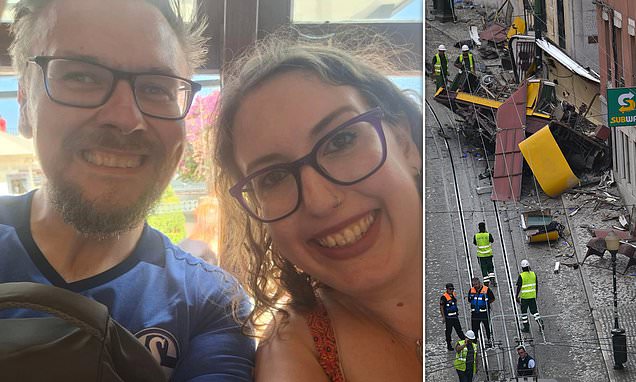What was meant to be a joyful getaway in Lisbon ended in devastation for two British tourists, Kayleigh Gillian Smith, 36, and her partner William Nelson, 44.
Just hours before their tragic deaths, the couple had shared photos online, smiling on a tram and enjoying their first day exploring the Portuguese capital.
Their posts captured the beauty of churches, castles, colorful tiles, and sunsets by the sea—moments of pure happiness before disaster struck.
The Funicular Crash That Shook Lisbon
On Wednesday evening, the pair were among 16 people who lost their lives when the Elevador de Glória, one of Lisbon’s most iconic funicular trains, derailed.
Packed with commuters and tourists during rush hour, the yellow-and-white streetcar veered off its rails near Restauradores Square, crashing into a building at the bottom of a steep hill.
Investigators believe a broken cable may have triggered the accident, though the exact cause remains unclear.
A Multinational Tragedy
Authorities revealed that victims included nationals from several countries—five Portuguese, three British, two Canadians, two South Koreans, one American, one French, one Swiss, and one Ukrainian.
A mix-up earlier in the week wrongly reported a German father among the dead, but he was later found alive in hospital.
His wife remains in critical condition, while their three-year-old child survived the wreckage.
Survivors and Injuries
Alongside the 16 fatalities, 21 people were injured and rushed to hospitals across Lisbon.
Forensic teams worked through Thursday and Friday to confirm identities, ensuring families were informed before details were made public.
Among the victims was André Marques, the brakeman on board, remembered by colleagues as a kind and dedicated worker.
Tributes also poured in for Portuguese teacher and referee Pedro Trinidade, as well as several employees of Portugal’s largest charity, Santa Casa da Misericórdia.
Leaders Express Grief and Solidarity
Prime Minister Luis Montenegro described the event as “one of the biggest tragedies of our recent past.”
British Labour leader Sir Keir Starmer said he was deeply saddened, while a spokesperson for Number 10 confirmed that the UK “stands united with Portugal during this difficult time.”
Candlelit Masses have since been held in Lisbon, with national and local leaders joining citizens to mourn the victims.
The Investigation Continues
While speculation grows about whether a snapped cable or a brake failure caused the derailment, officials have urged patience until full reports are ready.
Carris, the company responsible for the funicular, confirmed that the train had passed full maintenance checks last year and had been inspected just nine hours before the crash.
CEO Pedro de Brito Bogas noted that daily visual inspections were routine, but he stopped short of confirming whether all cables were tested on the day of the accident.
A City in Mourning
The Elevador de Glória has been in operation since the late 19th century and is beloved by tourists who line up daily for its short but scenic ride.
Now, the tracks are silent.
Lisbon’s City Council has suspended operations of three other funiculars while emergency inspections take place.
Looking Ahead
A preliminary police report is expected within 45 days, with multiple agencies conducting parallel investigations.
For Lisbon, a city that welcomed 8.5 million tourists last year, the disaster raises urgent questions about transport safety.
“The city needs answers,” Lisbon’s mayor Carlos Moedas said, as residents and visitors alike wait for clarity.
